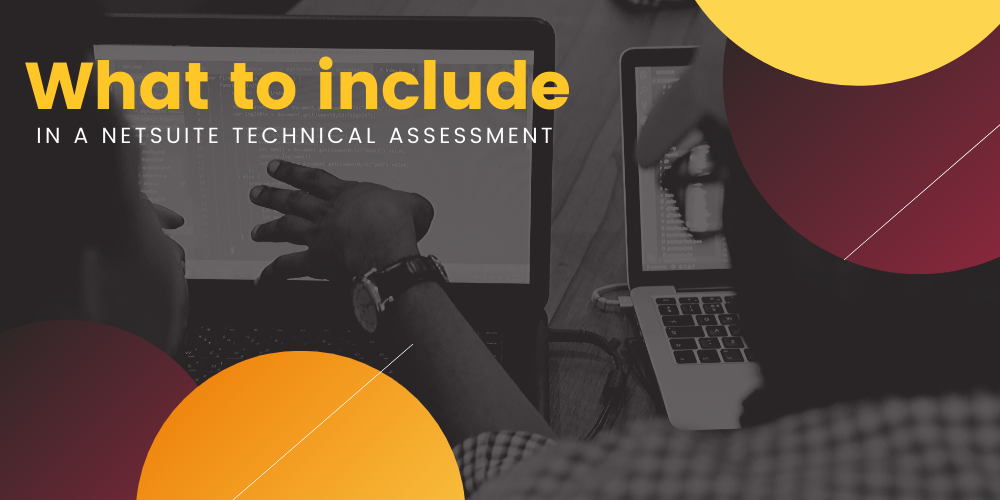What to include in a NetSuite technical assessment

When hiring a NetSuite professional, it’s essential to consider how you want to test candidates.
But the question is: do you rely solely on interviews, or do you also include a NetSuite technical assessment to prove their proficiency?
Carefully crafted interview questions can tell you a lot about a person’s character, previous training, and experience both within and outside of your industry.
Nevertheless, an interview can limit your ability to see how skillful the professional is. Before hiring someone, you may find it useful to deploy a NetSuite technical assessment as a second part of the hiring process.
A NetSuite assessment can be an intensive, as well as time-consuming, process. To make life a little easier for you, we recommend pairing the assessment with a more traditional one-to-one interview.
Learn how to conduct the perfect NetSuite interview.An interview is still an essential way to measure a candidate’s relevant experience, allowing you to assess how passionate they are about the role and how well they will fit into an existing team. But, a technical assessment will let you observe their problem -solving skills in action.
To get the most of this NetSuite interview tactic, you need to plan a proper assessment—one that highlights the applicable skills within a working environment and is beneficial for both the candidate and your company in the long run.
Here’s what you need to do to create the most relevant NetSuite technical assessment:
- Preparing a candidate for a Netsuite assessment
- Include content applicable to NetSuite
- Measure both hard and soft NetSuite skills
- Consider a ‘homework’ aspect to your NetSuite assessment
- Provide constructive feedback for your NetSuite professional
Make sure candidates are prepared for a NetSuite assessment
The most important thing to include in your NetSuite assessment is a fair warning for the candidates. Most people do not perform at their best when they are surprised with a long and in-depth test scenario as they walk through the door. Springing a test on a candidate is unlikely to endear you to them either.
Nevertheless, some interviewers still like to give unsuspecting candidates a jolt, and will argue that this tactic offers you the chance to observe how a candidate reacts and performs under pressure. But the reality is that most candidates are likely to feel ill-prepared at best, and tricked at worst.
Over three-quarters of our NetSuite survey participants have been involved in an implementation project in the last year.
With 76% of those respondents claiming their workload will increase in the next 12 months. Use the data from our independent NetSuite market report to optimize your candidate’s technical assessment.
What are the benefits of alerting candidates before their NetSuite technical assessment?
Firstly, it will give them time to prepare and brush up on any aspects of the role that may not have been a priority in their previous jobs. Telling a candidate what to expect in terms of how the assessment is structured and what it focuses on should be best practice, as it allows the keenest candidates to do their research.
A candidate who has prepared, planned, and done everything they can to make an impression is the kind of candidate that you should want to bring into your company. Being prepared demonstrates a willingness to perform at the highest level and great organization skills; skills that will transfer seamlessly into a working environment.
Include content relevant to a NetSuite professional
A NetSuite technical assessment needs to be focused on getting the best results from candidates. To maximize effectiveness, work out which NetSuite abilities are relevant to the job you are offering.
This may alter slightly depending on what kind of NetSuite role you’re looking to fill, but any candidate should have foundational NetSuite skills as well as the role-specific proficiencies that will make them a great developer, administrator, or consultant.
Here are some of the knowledge, skills, and abilities that you should be testing as part of your NetSuite assessment:
- How to capture leads in NetSuite
- Lead conversion in NetSuite
- Explain the differences between NetSuite versions
- Generate tables
- Use SuiteScript
- Utilize plugins and SuiteApps
- Demonstrate how to keep data secure
- Publish new dashboards
- Import data
- Troubleshoot various problems
- Generate reports and searches
- Access saved searches
- Customize fields and views
For a NetSuite Admin, for example, Rob recommends asking them to perform the following tasks in any technical assessment:
Create a KPI Scorecard and show week over week, month over month, and year over year metrics for the following:
- Calls completed by sales reps
- Cases closed
- Sales orders fulfilled for product X or items of class X
- Average opportunity size created
Assess the data quality of lead and prospect data for marketing
- What are the metrics are you looking for?
- How would you improve the quality of our database
Create a workflow to generate a phone call for a sales rep:
- When a contact gets created for my clients
- When that contact has participated in a marketing campaign or filled in a form
Describe the process of setting up a new NetSuite subsidiary:
- When are some things to consider when setting up a new tax nexus?
Create a simplified P&L Report that:
- Only shows last quarters results
- Only shows top-level accounts and sections
- Doesn’t show compensation/salary data
- Doesn’t show other income/expense
- Can only be viewed by role X
Measure both technical and transferable skills with a NetSuite assessment
It’ll be very tempting when putting together your NetSuite technical assessment to include nothing but ability-testing challenges. While it’s vital to measure the proficiency of a candidate’s technical skill set, it’s equally important to test whether or not they have the soft skills needed to compliment your team.
Soft skills are just as important as technical skills; they’re what makes a candidate a great member of the team. A candidate needs to be a NetSuite all-rounder that can master the NetSuite dashboard, but can also manage their own time, communicate their ideas, and educate others, all while taking ownership of their work and unifying their team for the greater good of the company.
The most valuable soft skills include:
- Communication
- Leadership
- Self-motivation
- Teamwork
- Responsibility
- Decisiveness
- Problem-solving
- Time management
- Flexibility
- Conflict resolution
Granted, soft skills are harder to test within the confines of an assessment than technical skills such as SuiteScript proficiency. There are ways that they can be incorporated, however, especially if you are running a simulation. For example, providing the candidate with a stand-in colleague who acts as a subordinate or an opposing viewpoint throughout will demonstrate communication, leadership, teamwork, and conflict resolution.
Consider a ‘homework’ aspect to the NetSuite assessment
Up to this point, we have primarily considered the NetSuite technical assessment as being phase two of the interview process. However, there is nothing to stop you from switching things around.
An excellent technical assessment can be used as part of the filtering of candidates, helping to streamline the list of interviewees. It can also be beneficial and more efficient to provide a challenge that can be completed in the candidate’s spare time.
For example, anyone sitting a NetSuite developer assessment could be presented with a coding task in advance that must be finished at home and submitted ahead of interview shortlisting.
NetSuite professionals love to work from home.
In our latest salary survey, remote working was voted as one of the best perks an employer can offer a NetSuite candidate — followed by stability, working with new products, and a positive working environment. Learn how to put together the best benefits package to attract the right NetSuite candidate for your role.
A ‘homework’ task provides excellent discussion points for anyone successful at landing an interview. We suggest asking further questions about the work to allow the candidate to expand on their methodology and discuss any challenges they faced.
Finally, assessing candidates with a pre-interview task will allow you to filter out the weaker candidates and make time for interviewees willing to go the extra mile to have a career within your company.
Provide meaningful feedback for the NetSuite professional candidate
Regardless of how well a candidate performs during a NetSuite assessment, anybody in charge of the hiring process for your company should be sure to provide feedback. It’s something of a golden rule that should not be broken.
Providing candidates with relevant, meaningful, and timely feedback is a vital matter, especially if they’ve taken the time to sit your NetSuite technical assessment. Candidates deserve to know what they did well and whether they matched the expectations that you and your team had of test subjects. This will allow them to perform better in the future. Also, if you decide to conduct assessments pre-interview, you can get the candidate to evaluate the process, asking them to discuss the strengths and weaknesses they came across during the assignment.
Assess your next great NetSuite hire
If you’re looking for NetSuite professionals that have been pre-screened to guarantee their knowledge and expertise, then look no further. visit our Candidate Search today.





